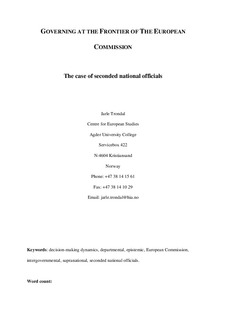Governing at the frontier of the European Commission : the case of seconded national officials
Working paper
Permanent lenke
http://hdl.handle.net/11250/134887Utgivelsesdato
2005Metadata
Vis full innførselSamlinger
- CES Working Papers [28]
Sammendrag
Studies of executive institutions have largely dealt separately with national and international executive institutions (IEIs). This study unpacks and repacks four conflicting decision-making dynamics that unfolds at the frontier of IEIs – that is, at the institutional rim where national and international executive institutions meet, interact and collide. The empirical laboratory utilised is seconded national experts in the European Commission. The survey and interview data presented demonstrates that the decision-making behaviour of seconded national experts includes a mix of departmental (portfolio), epistemic (expert) and supranational behaviour. The suspicion early voiced by Coombes (1970) that seconded national experts to the European Commission are highly conscious of their national background and that they represent domestic Trojan horses into the European Commission is severally challenged by this study. Arguably, the decision-making dynamics observed at the frontier of the Commission seem less affected by the member-state administrations and the international organisation in which the Commission is embedded, and strongly by organizational characteristics of the Commission itself.
